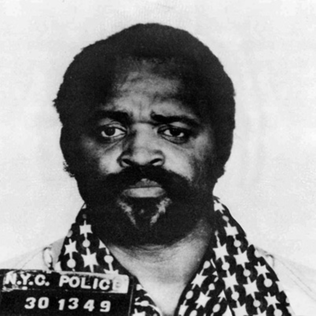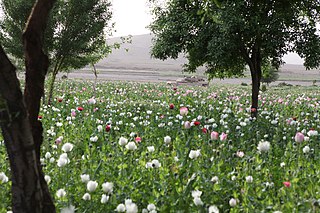Related Research Articles

Hamid Karzai is an Afghan politician who served as the fourth president of Afghanistan from July 2002 to September 2014, including as the first elected president of the Islamic Republic of Afghanistan from December 2004 to September 2014. He previously served as Chairman of the Afghan Interim Administration from December 2001 to July 2002. He is the chief (khān) of the Popalzai Durrani tribe of Pashtuns in Kandahar Province.

Gulbuddin Hekmatyar is an Afghan politician, former mujahideen leader and drug trafficker. He is the founder and current leader of the Hezb-e-Islami Gulbuddin political party, so called after Mohammad Yunus Khalis split from Hezbi Islami in 1979 to found Hezb-i Islami Khalis. He has twice served as Prime Minister during the 1990s.
Bashir Noorzai is a convicted former Afghan drug lord. He was an early supporter of the Taliban movement and later worked as an undercover agent on behalf of the U.S. government. Despite being among America's most wanted drug traffickers, he agreed to come to New York City for a debriefing after being promised by his handlers that he would not be arrested. He was arrested ten days after his arrival. In the aftermath of Afghanistan take over by the Taliban, the group demanded that the US release him in exchange with an American engineer, Mark Frerichs, who was kidnapped by the group in January 2020.

Ahmed Wali Karzai was an Afghan politician who served as Chairman of the Kandahar Provincial Council from 2005 until his death. He was the younger paternal half-brother of former Afghan President Hamid Karzai and an elder of the Popalzai tribe. Wali Karzai formerly lived in the United States, where he managed a restaurant owned by his family. He returned to Afghanistan following the removal of the Taliban government in late 2001. He has been accused of political corruption and was allegedly on the CIA payroll. He was assassinated by one of his close bodyguards, Sardar Mohammad, on 12 July 2011.

Leroy Nicholas Barnes was an American crime boss, active in New York City during the 1970s.

The United States Central Intelligence Agency (CIA) has been accused of involvement in the trafficking of illicit drugs. Books and journalistic investigations on the subject that have received general notice include works by the historian Alfred McCoy, professor and diplomat Peter Dale Scott, journalists Gary Webb and Alexander Cockburn, and writer Larry Collins. These claims have led to investigations by the United States government, including hearings and reports by the United States House of Representatives, Senate, Department of Justice, and the CIA's Inspector General. The various investigations have generally not led to clear conclusions that the CIA itself has directly conducted drug trafficking operations, although there may have been instances of indirect complicity in the activities of others.

Afghanistan has long had a history of opium poppy cultivation and harvest. As of 2021, Afghanistan's harvest produces more than 90% of illicit heroin globally, and more than 95% of the European supply. More land is used for opium in Afghanistan than is used for coca cultivation in Latin America. The country has been the world's leading illicit drug producer since 2001. In 2007, 93% of the non-pharmaceutical-grade opiates on the world market originated in Afghanistan. By 2019 Afghanistan still produced about 84% of the world market. This amounts to an export value of about US $4 billion, with a quarter being earned by opium farmers and the rest going to district officials, insurgents, warlords, and drug traffickers. In the seven years (1994–2000) prior to a Taliban opium ban, the Afghan farmers' share of gross income from opium was divided among 200,000 families.

Protégé is a 2007 Hong Kong-Singaporean co-produced crime drama film written and directed by Derek Yee, starring Andy Lau, Daniel Wu, Louis Koo, Zhang Jingchu and Anita Yuen.
The following lists events that happened during 2004 in Afghanistan.
This article deals with activities of the U.S. Central Intelligence Agency related to transnational crime, including the illicit drug trade.

Abdul Jabar Sabet was an Afghan politician. In May 2006 Hamid Karzai appointed him Attorney General of Afghanistan.
Melvin Douglas "Little Melvin" Williams was an African-American actor, author, entrepreneur, public speaker, educator, community activist, gambler and reformed drug trafficker. Considered a drug kingpin in the 1960s, Williams was known for trafficking heroin in Baltimore before he was sentenced to prison in 1985. After his release he began working as a community activist to help reform the lives of underprivileged minorities and youth. He later appeared as “The Deacon” in the HBO series The Wire and served as an inspiration for the show.

Mohammed Daud Daud, also known as General Daud Daud, an ethnic Tajik, was the police chief in northern Afghanistan and the commander of the 303 Pamir Corps. He was an opponent of the Afghan Taliban.
A drug lord, drug baron, kingpin, or lord of drugs is a type of crime boss, who is in charge of a drug-trafficking network, organization, or enterprise.

The National Drug Law Enforcement Agency (NDLEA) is a federal law enforcement agency in Nigeria under the Federal Ministry of Justice charged with eliminating the growing, processing, manufacturing, selling, exporting, and trafficking of hard drugs. The agency was established by Decree Number 48 of 1989. The NDLEA is present in international airports, seaports, and border crossings. The NDLEA also targets the leaders of narcotics and money laundering organizations.
Rosario "Sal" Gambino is an Italian mobster in the Gambino crime family. He became nationally known when he and his brothers set up a multimillion dollar heroin cartel during the 1970s and 1980s. At the turn of the century he made headline news again when members of his family were suspected of trying to get him a presidential pardon through bribery.
Yong Vui Kong is a Malaysian who was sentenced to death in Singapore for trafficking more than 15 grams of heroin in 2007. His sentence was reduced to life imprisonment and caning as a result of Singapore's amendments to the Misuse of Drugs Act.

Corruption in Afghanistan is a widespread and growing problem in Afghan society. Transparency International's 2022 Corruption Perceptions Index ranks the country in 150th place out of 180 countries. The 180 countries of the Index are scored on a scale of 0 to 100 according to the perceived corruption in the public sector, and then ranked by their score. Afghanistan's 2022 ranking was based on a score of 24. For comparison, the best score was 90, the worst score was 12, and the average score was 43.
Hawala and crime describes notable examples of hawala used in money laundering.
References
- 1 2 3 Matthew Pennington (2007-03-09). "Afghan official was a heroin trafficker". Tulsa World . Retrieved 2007-12-27.
- 1 2 3 4 5 6 7 8 9 Matthew Pennington (March 9, 2007). "Afghan anti-corruption chief is a convicted heroin trafficker". USA Today . Retrieved 2008-02-18.
- ↑ "Afghan anti-corruption chief a convicted U.S. felon". International Herald Tribune. March 11, 2007. Retrieved 2008-02-18.
- ↑ Justin Huggler (10 March 2007). "Afghan anti-corruption chief is drug dealer". The Independent . Archived from the original on 22 March 2007. Retrieved 2007-12-27.
- ↑ "Afghanistan's anti-corruption chief once sold heroin in Las Vegas". Wordpress. 2007-08-29. Retrieved 2007-12-27.